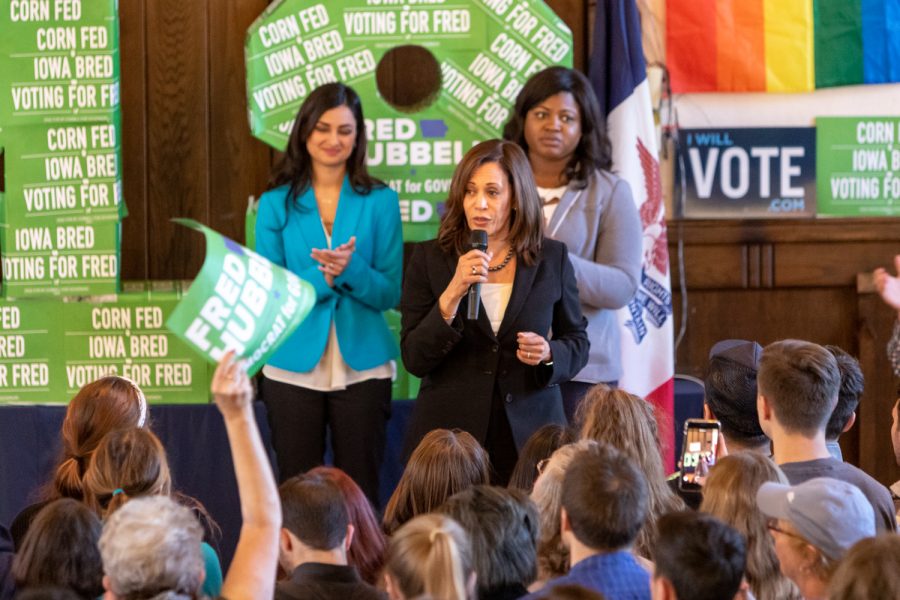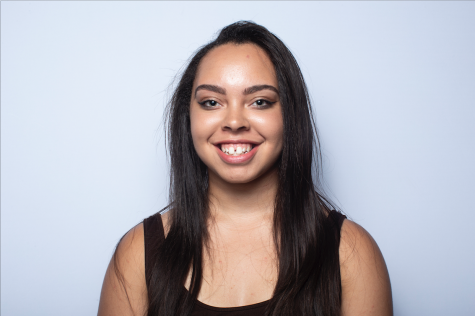Shaw: Kamala Harris is an unjust presidential candidate for the black community
Harris’s controversial past in the criminal justice system may negatively impact her bid for the presidency in 2020.
Sen. Kamala Harris (D-Calif.) addresses a rally at Old Brick in Iowa City on Tuesday, Oct. 23, 2018
February 3, 2019
A New York Times column recently pointed out the controversial nature of California Sen. Kamala Harris’ background on criminal-justice issues after Harris announced her bid for the 2020 presidency, condemning her for being regressive. The column’s visibility brought an awareness to Harris’ law career in California as district attorney and attorney general.
The most vocal of Harris’ critics have come from the African-American community, which surprised some, because Harris is an African-American woman.
Delving deeper, I found that Harris has a complex background in politics and criminal justice, with a mixture of regressive stances that have “terrorized” the black community and progressive initiatives that aim to help nonviolent offenders.
On the regressive side, Harris has consistently shown support for convicting African Americans, even when evidence suggests or cements their innocence — unless the media publish the controversial evidence and scathing review of her actions in enabling wrongful conviction of African-American defendants. Just one of those accounts was the death of inmate Kevin Cooper, whose trial was “infected by racism and corruption,” University of San Francisco law Professor Lara Bazelon wrote in a Times opinion column. Cooper requested DNA testing to prove his innocence, but Harris opposed the request. Only after a Times opinion column exposed the unfair case did Harris reverse her position.
RELATED: Neal: The split left: preparing for 2020
Harris also supports the three-strikes law, which gives individuals convicted twice or more of a serious violent crime or drug crime a sentence of life in prison. The law disproportionately affects black prisoners 12 times more than whites in incarceration rates, according to Justice Policy Institute, further demonstrating to her history in enabling the disproportionate incarceration of African Americans.
In 2015, according to the Sacramento Bee, she didn’t support the statewide requirement for police agencies to adopt body cameras — instead, she supported the decision that each department should determine what technology to use to practice ethical policing.
On the other hand, the Harris-led California Attorney General’s Office was the first agency to adopt a statewide initiative for implicit-bias training and body-camera program, according to a 2015 agency news release. In this aspect, Harris has displayed a somewhat progressive stance on particular issues. Her “Back on Track” 2005 program prevented recidivism for nonviolent, first-time offenders, which could be seen as progressive.
But do those programs really outshine her history of sanctioning the disproportionate incarceration and conviction of black individuals in the California Justice Department?
“My whole life, I’ve only had one client: the people,” Harris told a crowd of thousands of supporters gathered in front of Oakland City Hall.
RELATED: Helton: 20 Out of 20: Iowa is getting crowded fast. Can Kamala Harris stand out?
In retrospect, her record doesn’t really support this image. We have only seen her progressive support of the people in her time as district attorney from 2004-11. Since her term as attorney general through 2016, Harris has stayed silent on a lot of public issues that specifically target the black community.
In 2016, Harris “opposed a bill to require her office to investigate shootings by police, and she declined to weigh in on state ballot measures to legalize recreational marijuana and to reduce penalties for nonviolent crimes,” according to a January Politifact article.
In this look into Harris’ criminal-justice background, I would argue one thing is for sure: Harris is not a progressive front-runner for the 2020 presidential election. Rather, she is a candidate whose tough-on-(black-)crime history might appeal to some, but otherwise demonstrates a history of enabling disproportionate incarceration of African Americans.
When you vote in 2020, be sure to know the candidates’ stances and history in politics, as well as the kind of change they’ve already put forth in their respective communities. Harris may belong to the Democratic Party, but she definitely isn’t the “progressive” leader she claimed to be in her announcement speech.




















